Heating and air technicians are highly skilled and well trained in their field. To become an HVAC technician in Arizona, you must either enroll and complete a training program or become an apprentice and work under a journeyman to learn the trade.
Contractors who plan to work in Arizona must have licenses. HVAC/R technicians are in demand and well paid in Arizona. The mean yearly wage for HVAC/R technicians is approximately $45,000.

How to Become an HVAC Technician in Arizona
While not a lot of people realize this, being an HVAC professional requires a lot of technical skills. This is why, in order to be an HVAC technician in Arizona, one needs to enroll and go through a proper training program. If you are interested in being an HVAC technician in Arizona, here is what you’ll need to do.
- You can enroll in a training program offered by multiple institutes or simply become an apprentice under another journeyman who could teach you the basics and more. But before you do either, you need to have at least a high school diploma.
- If you enroll in a training program, you’ll be learning a number of physics principles, including mechanics of HVAC units and how to repair them.
- If you simply take an apprenticeship with a journeyman, you’ll get a deeper insight into the practical work involved without any scientific basis. Apprentices usually do not need certification because of the constant monitoring that they receive from certified technicians.
Along with the basics of HVAC units, their functioning, and their repairing, you will also need the skills that a pipe-fitter and electrician would possess to read pressure gauges and be able to test different joints for gas leaks.
What Makes Arizona a Great Place to Start an HVAC Career?
If you’re an HVAC technician that is looking to make a career, Arizona may be the perfect place for you to start. But you must be wondering why Arizona specifically. Let us tell you why.
Learning Opportunities
Arizona provides great learning opportunities for those looking forward to an HVAC career. It has a number of institutes that offer relevant learning and training programs that would allow one to excel as an HVAC technician. Every skill that you need in this career, the schools in Arizona, can teach you.
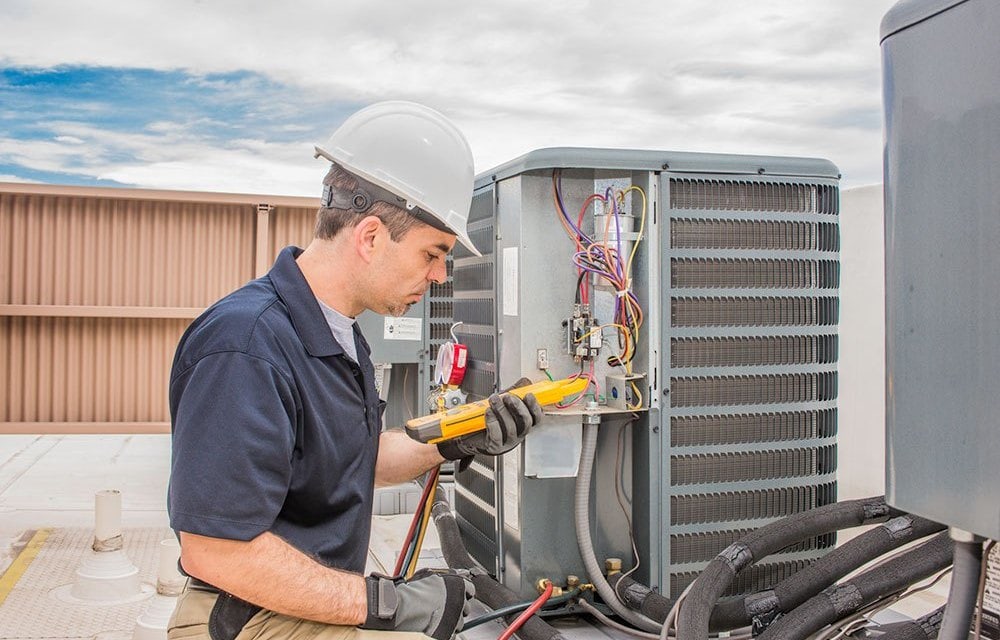
More Job Openings
Arizona not only offers learning opportunities but also job opportunities for an HVAC career. There are a great number of job openings for HVAC technicians in Arizona annually, allowing you a definite chance to find work.
If you want to reduce the chances of you being unemployed, then Arizona would be the place for you.
Higher Starting Salaries
No one that starts a job wants to be paid less. So it is natural for one to look for jobs that offer a higher starting salary. And Arizona will provide you with just that. Arizona is one of those places that offer a higher starting salary than rest. So if you want a better start, start here.
What You’ll Learn as an HVAC Technician
If you are thinking about a career in HVAC/R repair, you must have a high school diploma and specialized training. In Arizona, schools such as the Refrigeration School in Phoenix, provide training programs. The HVAC/R classes teach apprentice technicians physics principles.
They are taught the mechanics of the units and how to repair and maintain them to work efficiently. If you are looking for a school or program in Arizona that will help you become a certified HVAC tech then check out the schools below:
HVAC apprentices are taught about the construction of homes and businesses so that they will know how and where to install ductwork. They are taught precision skills and how to interpret technical plans. The HVAC/R technician is not only an air conditioner mechanic; they must be able to read and follow blueprints and engineering specifications.
They must also have the skills of a pipe fitter and electrician. They must be able to read the pressure gauges and test joints for gas leaks. They are able to replace defective breaker controls, thermostats, fuses, repair wiring to installed units, and fabricate ductwork.
They are able to properly use hand tools and soldering equipment. They are also able to use torches and other tools involved in construction and plumbing. Each of these skills must be mastered before the technician is licensed.
Before you are allowed to work on refrigerated appliances, you must take formal refrigeration classes and learn the regulations that affect the refrigerants. For example, the guidelines for handling and recycling refrigerants are set out in Section 608 of the Clean Air Act. Each HVAC/R technician must know how to handle leaking refrigerants and know when to retrofit, repair, or replace appliances.
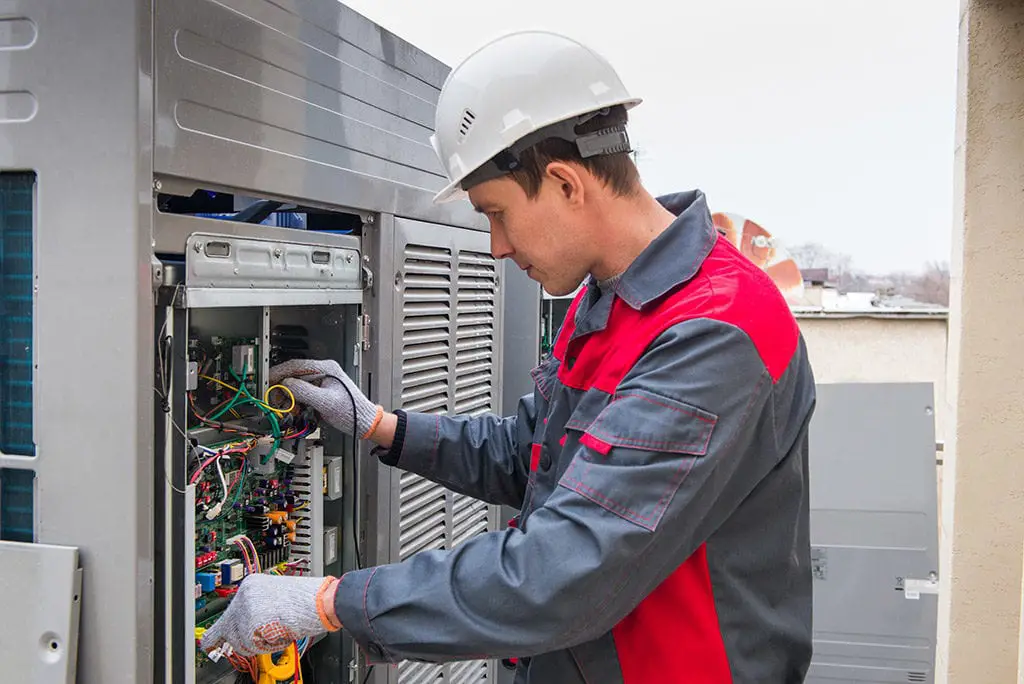
Apprenticeships
HVAC/R Technicians can be taught by HVAC/R journeymen, experienced and licensed technicians. People who are learning a trade from a journeyman are considered apprentices. Apprentices are exempt from these EPA certification requirements because they are being closely monitored by a certified technician.
Ongoing Education
HVAC/R technicians who graduate from vocational training programs are not finished with their education. They must stay informed about environmental protection laws and state and federal regulations. Ongoing professional development is important for a successful HVAC/R technician.
HVAC technicians must be diligent in their record keeping. HVAC/R technicians are taught to keep records of any work with refrigerants. They must be certified to purchase and use these chemicals.
Contractor Licensing
Arizona requires HVAC technicians who own their own businesses to be licensed by the Arizona Registrar of Contractors. HVAC technicians are licensed under the specialty commercial license classification requirements.
Contractors must have four years of experience before they can be licensed by the Arizona Registrar of Contractors with a CR-39 specialty license for Air Conditioning, Refrigeration and Heating, or a CR-79 specialty license Air Conditioning and Refrigeration Including Solar. Technicians must pass a business management exam and an Air conditioning and Refrigeration Trade Exam. Those who plan to work on solar units must also take the Solar Exam.
HVAC/R technicians must be lifelong learners. They must adapt as technology upgrades and changes. They must be willing to take classes to learn how to service and install new equipment. They must continue to keep up with the codes and regulations that frequently change. Learning is a career-long process for the HVAC technician.
Examination Process in Arizona
HVAC Technicians must earn their EPA Certification by passing a written exam. Technicians who want to own their own business must also be licensed as a contractor in Arizona. There are tests that must be taken and passed to become eligible for licensure. Additional information for each of these exams is discussed below.
EPA Certification

Arizona HVAC contractors must have EPA Section 608 technician certification. To become certified, technicians must pass an EPA-approved test. Once you are certified, your credentials do not expire. You can use our practice tests to help you prepare.Type I certification is required for servicing small appliances. Servicing high-pressure appliances requires Type II certification. Disposing of or servicing low-pressure appliances requires Type III certification.
If you plan to service all types of equipment, the Universal Certification replaces the individual certifications. The Universal Technical Institute in Scottsdale and The Refrigeration School, Inc. in Phoenix are two locations that provide on-site training for this certification and are test centers.
Job Outlook and Salary For HVAC in Arizona
The job outlook and salary for a specific profession tend to vary from one state to another. If you want a better idea of what sort of pay rate and job outlook you’ll get, for your level of expertise in the field, then here is a quick summary of job outlooks and salaries in Arizona, specifically for HVAC technicians.
Average Hourly Pay of HVAC in Arizona
If you look at the average hourly pay that HVAC technicians receive in Arizona, then the amount would add up to about $24-$25 per hour. And if you further add the overtime that you can work in a year, you can earn up to $5,875 in a year.
Entry-Level
Being an HVAC technician and that too in Arizona would allow you a great job outlook and salary even at the starting of your career. You can easily earn about $20-25 per hour with a year or two of experience, or even less than that.
Mid-Level
If you have greater experience as an HVAC technician and have been working for about five to eight years, the amount you earn per hour goes higher. You can earn up to $30-35 in an hour, not to mention the greater job opportunities that come with greater experience.
Master-Level
A career in HVAC is highly lucrative if you possess master-level expertise in the field. If you have about ten or more years of experience in the field, you can expect your earning to be around $45-50 per hour. With greater experience, you’ll be bound to find a job easier and also receive a number of other benefits from the company itself.
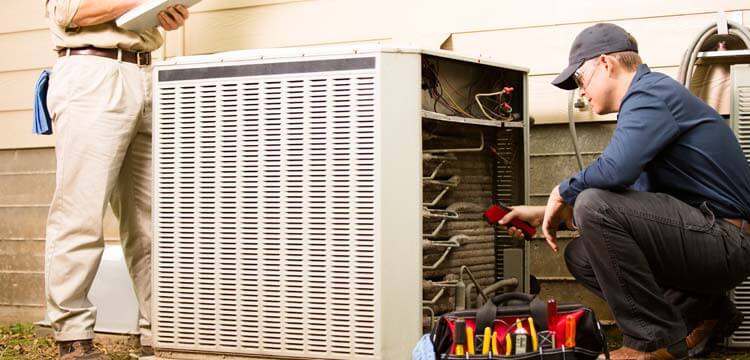
Insurance and Tax Information For HVAC Techs in Arizona
There are a number of requirements when it comes to any job. Insurance and tax requirements are made by certain job specifications, but not for HVAC technicians.
As a technician, you do not need to meet any insurance requirements, but for an HVAC contractor to obtain the license, worker’s compensation insurance needs to be obtained.
When it comes to tax requirements, there are none for HVAC technicians or even contractors in Arizona. This is why it is easier to start a career as an HVAC technician in Arizona since it simply has much lesser requirements.
HVAC Schools in Arizona
Are you looking for an HVAC school in Arizona? A list of HVAC programs can be found by inputting your zip code below:
Contractor License Examinations
PSI Exams administers the exams for the Arizona Registrar of Contractors. These written or computer-based exams can be taken in Flagstaff, Glendale, Phoenix, Scottsdale, Tempe, Tucson, and Yuma. Candidates may register online and must pay exam fees in advance.
If you take the test on the computer, you will know immediately if you passed because your score will appear on the screen after the test is completed. If you take the written exam, you will receive an unofficial score report after your test is completed.
The Candidate Information Bulletin provides information about the exams and contains a registration form that may be printed and mailed for registration. The Arizona edition of the NASCLA Contractors Guide to Business, Law and Project Management is available for purchase at the PSI Online Store.
There are two parts of the Trade Exam. The AZ R-39/C-79 Air Conditioning and Refrigeration (Residential/Commercial) exam is a lengthy exam. Each candidate is given 210 minutes to complete the test.
Candidates who take the Solar Exam are given 75 minutes to complete this portion of the exam. The Arizona Business Management Exam is lengthy also. Each candidate is given 180 minutes to complete the exam.
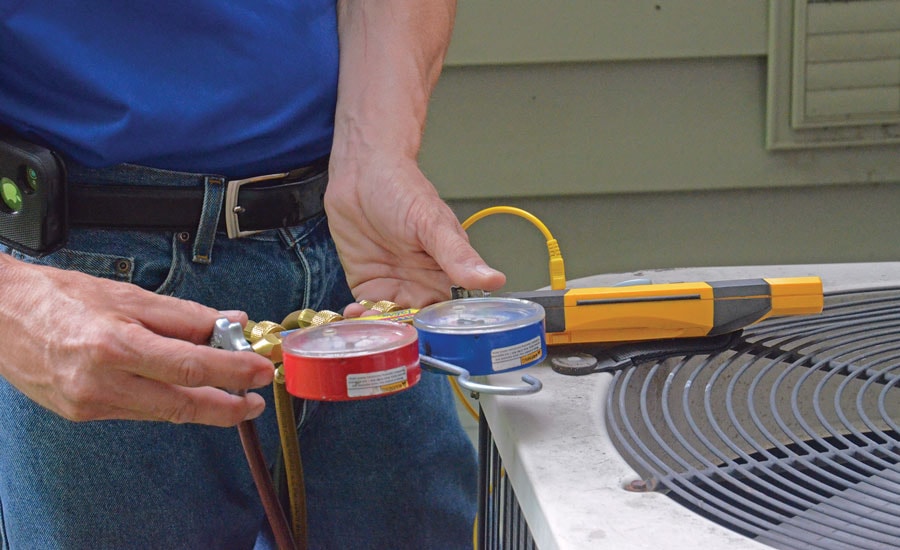
Reference Materials
The Content Outline of the exam is available from PSI Online. Questions are based on trade knowledge and Code books. Calculators are allowed for use in the exam room during the test.
A copy of the Code of Federal Regulations 29 CFR Part 1926 (OSHA) with the newest amendments is also allowed to be brought into the exam room. The International Fuel Gas Code, the International Mechanical Code 2009, and the International Plumbing Code, 2009 are also allowed to be brought into the exam room.
It is recommended that you study and know your reference materials that you bring into the exam room. They can be highlighted, underlined, notated, and indexed prior to the exam.
However, you may not write in the references during the exam. If you write in your references during the exam, you will be reported to the Arizona Registrar of Contractors. Post-it notes are not allowed.
Temporary tabs are also not allowed. You must have permanent tabs that would tear a page if removed. No additional bookmarks, index cards or loose papers may be inserted into the reference materials. If you print any of these references from the internet, they must be hole-punched and placed in a binder or spiral bound.
Specific reference material that should be studied but not allowed in the exam room include:
- Modern Refrigeration and Air Conditioning, Althouse, Turnquist, Bracciano, 19th or 20th edition, Goodheart-Wilcox
- Low Pressure Boilers, Frederick M. Steingress, Daryl R. Walker, 2009, 3rd edition, American Technical Publishers, Inc.
- ACCA Ductulator, Air Conditioning Contractors of America
- Solar Water and Pool Heating Design and Installation Manual, 1997, Florida Solar Energy Center.
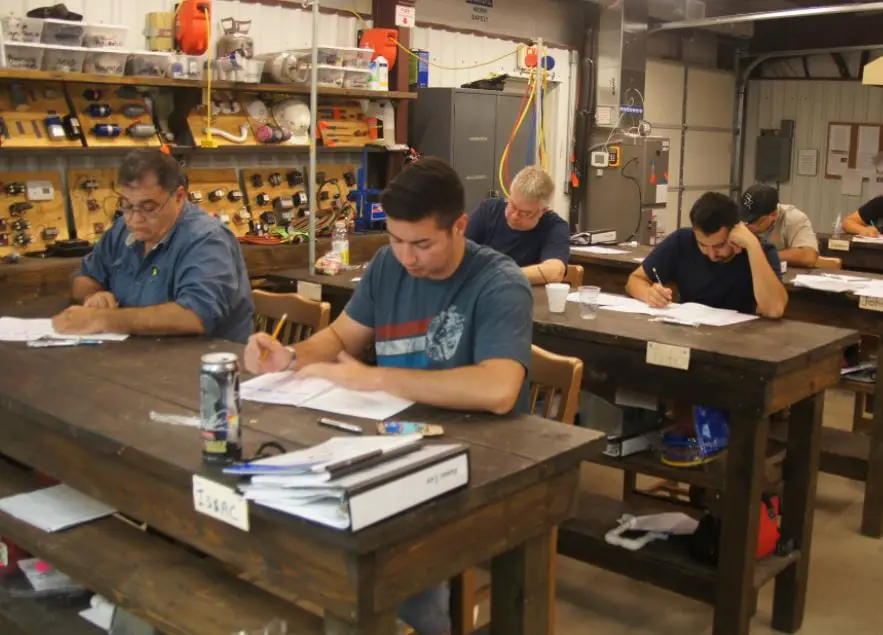
Conclusion
HVAC technicians must be willing to spend time learning their trade as an apprentice and continue to hone their skills throughout their careers as a journeyman. They must obtain licensure and obey the federal regulations for record keeping. Training programs are available in Arizona, and this career field is expanding as the solar technology evolves.
People Also Ask
This article attempts to clear all your queries and doubts regarding being an HVAC technician in Arizona, but there may still be some questions that you are pondering over. In order to help you out, here we have answered some of the most frequently asked questions by other users.
The investment that one needs to make to get proper training as an HVAC technician is a considerable one, but it is also one that definitely pays off. If you enroll for an undergraduate certificate in HVAC, then the program’s cost would be about $15,000 to $20,000 in total.
The procedure to earn certification for installing HVAC in Phoenix, Az, are the same as mentioned above. However, it must be remembered that apprenticeship is not enough for any certification, and one needs to clear a training program appropriate for the certification.
If you want to pursue a career as an HVAC technician, you do not need a license to practice. All you need is a certification or an apprenticeship. But if you want a contractor license, you need a minimum of four years of experience, along with clearing an exam for licensure and fulfilling insurance requirements.
There is a greater demand for HVAC technicians in Arizona as there is in other states. In 2020 alone, all across the USA, the HVAC workforce is expected to rise to 12%, but for Arizona, it goes higher, up to 29%. This clearly shows the higher demands for HVAC technicians in this state.
Looking For Information On Nearby States?
You might also be interested in HVAC licensing requirements in bordering states:

Do you reciprocate with any states if so which ones. Also is it possible to email me an application for the test?
Hi Glenn,
It appears that Arizona does not have any reciprocal agreements. However, they do offer exam waivers with states where the license is “deemed comparable” from another state. So I guess that’s actually broader – it may cover more than just a couple local states the way most reciprocity agreements do.
You can find info and links to download the form here on the state’s website. I included the overview link because there’s more important info to follow there.